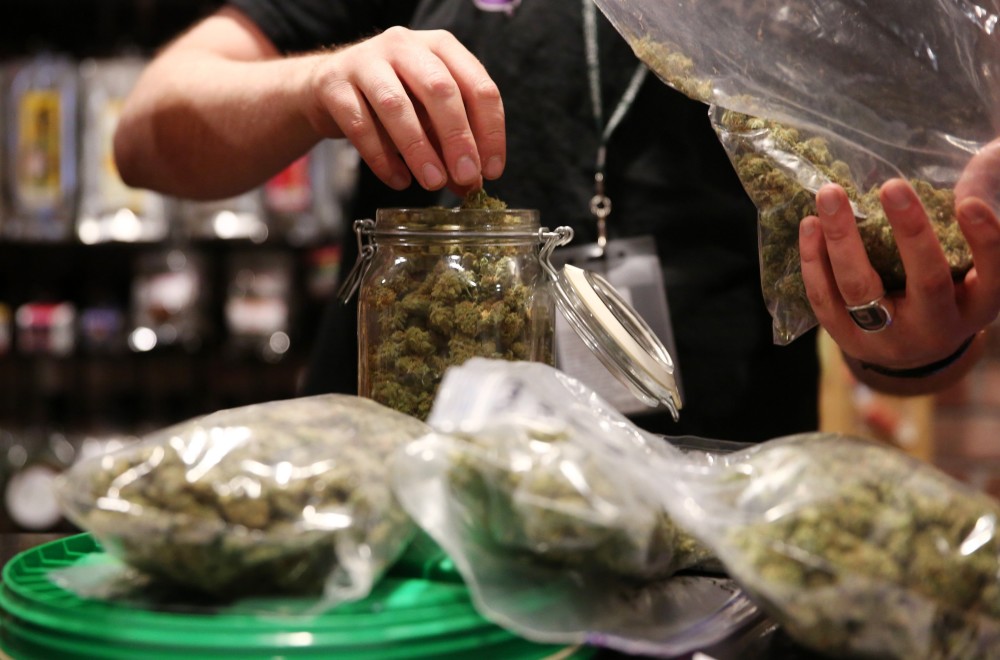By Colleen Jones
The St. Augustine Record, Fla.
WWR Article Summary (tl;dr) The process required to gain eligibility for medical marijuana use as well as the cost of physician evaluations and the drug itself, can be expensive.
The St. Augustine Record, Fla.
Medical marijuana use is on the rise in Florida.
Since Florida voters legalized marijuana for a number of qualifying conditions in a 2016 referendum, the state has added almost 150,000 patients to the Office of Medical Marijuana Use’s registry, according to the Department of Health. The department receives an average of about 2,500 new applications each week.
But the process required to gain eligibility for use of the low-THC cannabis, as well as the cost of physician evaluations and the drug itself, can be prohibitive for some.
The passage of the referendum at first sounded like the magic treatment Max and Michelle Vinzant were looking for to help their 18-year-old daughter, Marlee, who suffers with regular epileptic seizures — sometimes as many as 10 a week.
Where other interventions and treatments had failed, a year-long clinical trial Marlee took part in to test medical marijuana provided almost immediate relief.
But when the family began the process to put her on a regular regimen last year, they found it was out of their price range. Everything would be out-of-pocket since insurance does not cover medical marijuana.
“It was going to be a 90-day wait after we saw the first doctor, who charged $200 and it was going to be another $200 for the next visit,” Vinzant said. “That was besides the $650 a month for the [medical marijuana] itself.”
On a teacher’s salary, Vinzant said, he just couldn’t afford it.
Instead, the family is using a cannabis derivative called CBD — short for cannabidiol — the plant’s non-high compound.
“It seems to be helping somewhat; we may have to increase the level,” Vinzant said. “We’re just hoping the cost of medical marijuana becomes less expensive.”
Even before it became legalized, entrepreneurs from growers to dispensaries flooded the medical pot market.
Tallahassee-based Trulieve, for example, has expanded to more than 20 locations across Florida, and in June received approval to open a store in St. Augustine in the near future.
“Business is fantastic, we’re doing really well,” said Jonathan Carr, a local representative with Trulieve.
Currently, there are four dispensaries in Jacksonville and most offer home delivery service via a non-marked vehicle for between $10 and $25.
Trulieve prices range from about $35 for a 250 milligram vape cartridge, to $115 for 20 capsules of 50 milligrams each, according to Carr.
Dispensaries put the average dose at about 100 milligrams, which would cost patients between $500 and $750 per month. Methods of delivery include tincture droplets, oils, topical creams, vaping, capsules, patches and even suppositories; it may not be smoked in bud form.
Because medical pot is still illegal under federal law, it’s an all-cash business.
Just like any other industry, dispensaries offer periodic sales or discounts for buying in bulk.
Potential customers are also required to see a state-approved physician. Dr. Robert Elkins, a former orthopedic doctor, opened the Cannabis Certification Clinic in the Whetstone professional building in St. Augustine last year.
Elkins’ office charges a $250 fee for a new patient evaluation, and $100 for an optional follow-up 70 days later. Re-certification, some 210 days later, is another $250. Two refills are allowed before the patient has to be re-certified.
The clinic also offers a free informational demonstration.
“We assume that they don’t know anything. We do Marijuana 101 and tell you what you need to do,” said Roberta Kaye, the office’s educational coordinator.
To see Elkins, a patient has to first prove a potentially qualifying condition to receive cannabis, which Elkins is required to corroborate. Some of these include glaucoma, epilepsy, PTSD, cancer or chronic pain.
Once the $75 application is approved by the state, a patient can fill the order recommended by the physician through an ID card at a licensed dispensary.
Dispensaries vary in their setup and atmosphere, but all have a security buzz-in system that allows just eligible registrants to get past the waiting room.
Products are typically displayed behind glass-fronted counters with salespeople to help customers fill orders.
“They’re going to help figure out the product that best suits them,” said Carr. “Some people are wanting to sleep at night, some just want to get off the couch in the morning.”
Each dispensary labels their products differently, from “New York City Diesel,” to “60/40” or “Calm and Serene,” Elkins said.
Patients can fill their entire order at once or spread the allowed total in their “bank” over a month or more. Elkins recommends his clients visit a dispensary, at least for the first time.
“You might want just one cone, or five gallons; or maybe you decide you like chocolate better than vanilla,” he said.
“John,” a 57-year-old man from St. Augustine, chooses to do his shopping in person rather than mail order or home delivery. The Record is withholding his name due to privacy concerns.
Even while “it doesn’t come cheap,” John said he’s seen tremendous relief for his rheumatoid arthritis and restless sleep syndrome since starting medical marijuana several months ago. He alternates between taking capsules and vaping the drug.
“It’s the most miraculous thing I’ve ever seen,” John said. “It helps you not think about the pain and focus on it. I’m just more relaxed overall.”














































































































































































































































































































































































